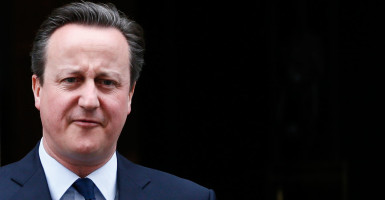American leaders can learn something from British Prime Minister David Cameron in responding to Islamic radicalization at home, policy experts said at a forum in Washington, D.C.
Promoting patriotism is the best way to counter domestic terrorism, panelists agreed at an event on Cameron’s approach held by The Heritage Foundation.
“Support for democracy, the rule of law, individual liberty, mutual respect for other faiths—these are the kind of things that Cameron is trying to shape his approach around,” Robin Simcox, Heritage’s new Margaret Thatcher fellow, said at the Feb. 25 event.
Simcox said Britain’s previous counter-terrorism policy provided money to Islamic fundamentalist groups because policymakers believed that such groups “served as a buffer from the truly hardcore extremists.”
“Some of these groups held extremist views, they had every right to hold them … it’s just that you shouldn’t base your entire counter-terrorism policy on what the Muslim Brotherhood tell you, and it certainly shouldn’t be taxpayer-funded,” Simcox said.
Last year, Cameron declared the international Muslim Brotherhood, which has ties to some of the largest Islamic groups in the United Kingdom, a threat to British security.
The Cameron government reformed policy on counteracting domestic radicalization, Simcox said, by delegitimizing radical groups, requiring some institutions to take action when they suspect members were being drawn into terrorist activity, and disabling broadcasts of extremist messages.
The British example provides “some lessons for the U.S. because the U.S. is ramping up its countering [of] violent extremism,” he said.
“I’ve only been in Washington a month, but I’ve already heard U.S. bureaucrats say … credible message carriers have been the people they need to fund,” Simcox said.
He cautioned that a poorly implemented policy could mean “truckloads of U.S. taxpayer cash ends up going to the local community leader, somebody with questionable credentials.”
Mary Habeck, a visiting scholar at the American Enterprise Institute and senior fellow at the Foreign Policy Research Institute, said the Islamist terrorist groups al-Qaeda and ISIS gained followers by using domestic radicalizers, many of them online, to target young Muslims:
This is a purposeful strategy by al-Qaeda and ISIS to use these people in order to push them towards their … extreme version of Islam, and especially towards some kind of violence.
Habeck said domestic radicalization is particularly problematic in the United Kingdom because Islamic terrorist groups have targeted it for decades.
She cited a report last year by the British intelligence agency MI5 that said its surveillance database of potential domestic Islamic terrorists had grown to more than 3,000.
Despite popular perceptions, Habeck said, “those people who are most attracted to the message being put out by these radicalizers” tend “to be Muslims with little or no religious background”—including a “disproportionate number of converts” to Islam.
A report released in December by the George Washington University Center for Cyber and Homeland Security Studies found that about 40 percent of those arrested in the U.S. who had connections with ISIS were converts to Islam.
In a 2011 speech, Cameron said “state multiculturalism” failed to prevent radicalization because it does not “provide a vision of society in which they feel they want to belong.”
Michael Gonzalez, a senior fellow at Heritage’s Kathryn and Shelby Cullom Davis Institute for International Studies, said that in the United States, “because we have abandoned patriotism and embrace multiculturalism, we have not instilled patriotic feelings.”
Gonzalez commended Cameron for his critique of past U.K. policy, arguing that such efforts have the effect of “dividing societies into groups.”
He added: “We have people who are born here, or at least raised here, who are completely divorced from our society, who are then vulnerable to recruiters from ISIS and al-Qaeda.”
Gonzalez said Boston Marathon bomber Dzhokhar Tsarnaev, who was “assimilated culturally,” shared something with the American-born San Bernardino shooter: “Neither one of these two were taught to love America.”
Gonzalez added:
David Cameron is the only major leader at least talking about these issues. The other leaders, our politicians, have refused to recognize national identity, multiculturalism, and diversity as causes of domestic homeland terrorism and many other ills.
>>>Watch the entire event: ‘Defeating Islamism in Britain: Assessing David Cameron’s Approach’




























